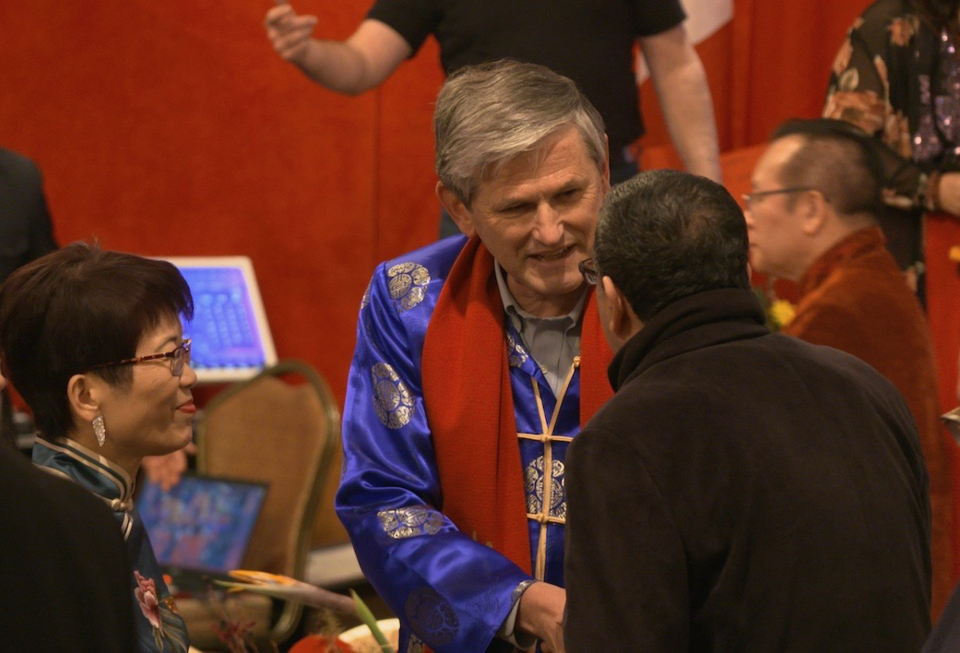BC Liberal leader Andrew Wilkinson says his party, if elected October 24, should “take cues” from the federal government on whether or not to further a 2016 economic and cultural agreement he signed with the Chinese Communist Party, now that diplomatic relations have soured following the detention of Huawei CFO Meng Wanzhou.
This, despite current MLA and BC Liberal election candidate Teresa Wat having already expressed the desire for “further deepening ties with China,” in 2019.
Wilkinson was advanced education minister for the BC Liberals when he and Wat, then Minister of International Trade, signed a memorandum of understanding (MOU) on China’s Belt and Road Initiative (BRI) between B.C. and Guangdong province.
Asked Saturday in Richmond if he and his party continue to support the BRI agreement and furthering trade with China, in general, Wilkinson replied: “We would obviously have to work with the federal government, which has the primary responsibility for foreign affairs, to establish the current nature of the relationship with China, because a lot has happened in the last three years.”
Wilkinson said the imprisonment of Canadians Michael Spavor and Michael Kovrig in China are top of mind for him, adding “the relationships based on trade and family linkages are still strong but the official relationships are in a different place.”
When asked if she would want to further trade ties with China, Wat said, “We have to look at the whole environment and see what it’s like, but definitely we have to promote trade with all countries of the world because British Columbia is a small market and we have so many natural resources. We need to depend on trade.”
But Wat was more specific in 2019 when she spoke at a trade event in Metro Vancouver, telling her audience, in Mandarin, she has “many plans with regards to further deepening ties with China.”
Wat expressed doubts that the BC NDP, which took control of government in June 2017, would initiate further trade relations with China and told Chinese trade officials they ought to press her NDP replacement, Minister of State for Trade George Chow, to maintain links between B.C. and Guangdong.
Wat described B.C. and Guangdong as a “one belt, one road link” that ties North America and Southeast Asia, respectively, to China.
At one point Wat seemed to be speaking on behalf of both sides, referring to Guangdong’s (CCP) General Secretary as “our general secretary.”
Wat, who promoted a Huawei 5G lab in B.C. in 2015, described the Meng extradition process and subsequent diplomatic row as a challenge that could be overcome and a temporary upheaval.
Wat declined to be interviewed this week.
Canadian provinces are free to craft international trade policies with unsanctioned countries. While serving as B.C. premier, Christy Clark signed what remains a rare BRI agreement between China and a western jurisdiction, and without explicit consent from Ottawa, which subsequently did not object.
In July, Global Affairs Canada, Canada’s ministry in charge of international trade, declined to comment on what position the country takes on the BRI, which is strongly opposed by the United States.
This week, Trudeau accused China of “coercive diplomacy,” which resulted in a rebuke from China’s embassy in Ottawa. Trudeau also described the imprisonment of the two Michaels as “arbitrary” and in response to the December 2018 detention of Meng, to face an extradition hearing to face fraud charges in the United States.
Conservative Party of Canada human-rights critic Garnett Genuis has likened the BRI to a road map of modern-day colonization by the CCP.
Most western jurisdictions have been apprehensive about President Xi Jingping’s global aspirations for China, as promoted through the BRI’s foreign infrastructure investments and overseas financial, social and cultural programs, which initially targeted developing Asian countries.
The BC NDP has declined several times to answer questions on the status of the BRI MOU under its watch.
It’s understood the BRI MOU is not legally binding but there are indications of the policy being entrenched in B.C., such as a massive China state-sponsored warehouse development in Surrey, and a Confucius Institute in Coquitlam.



